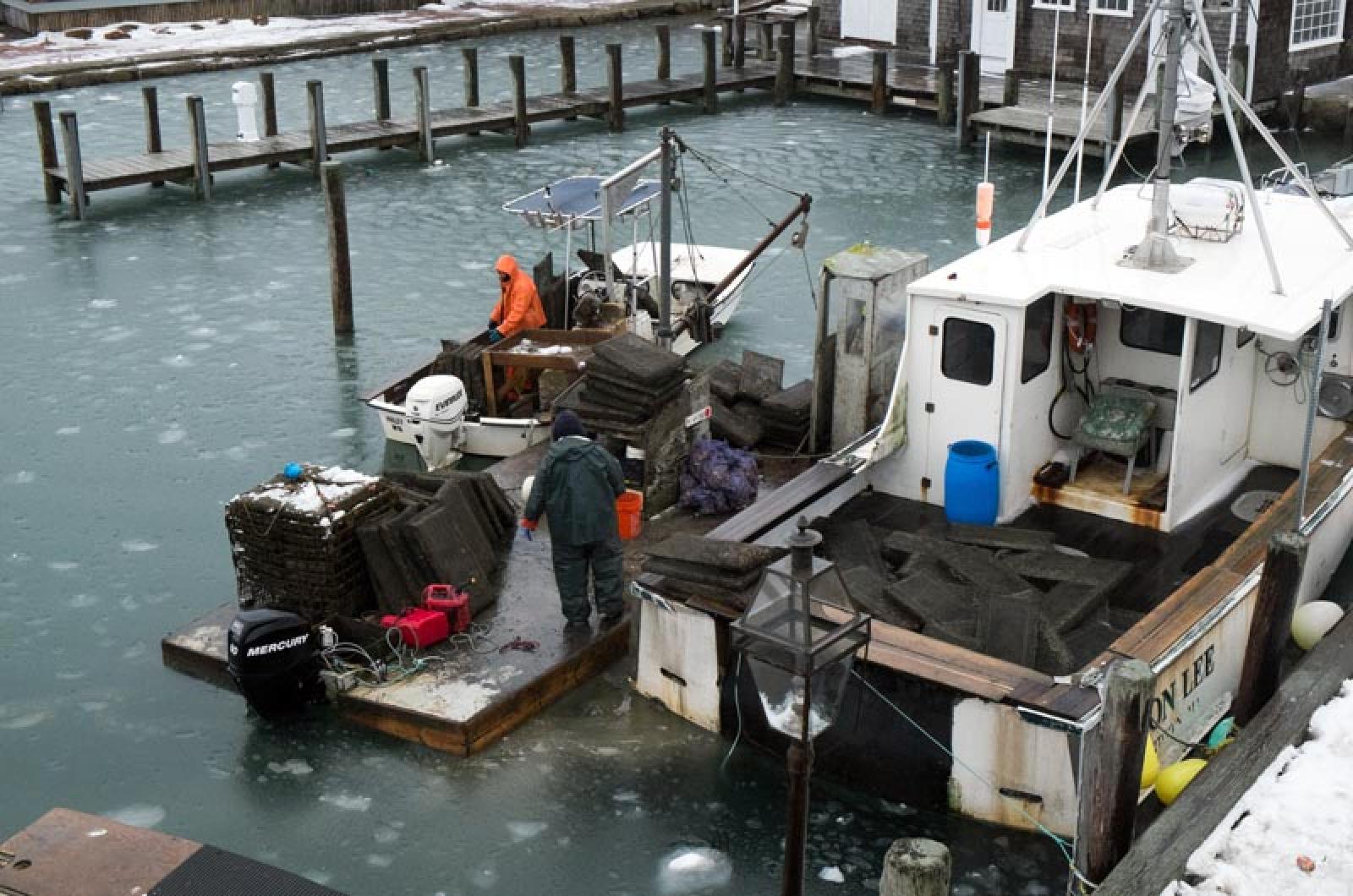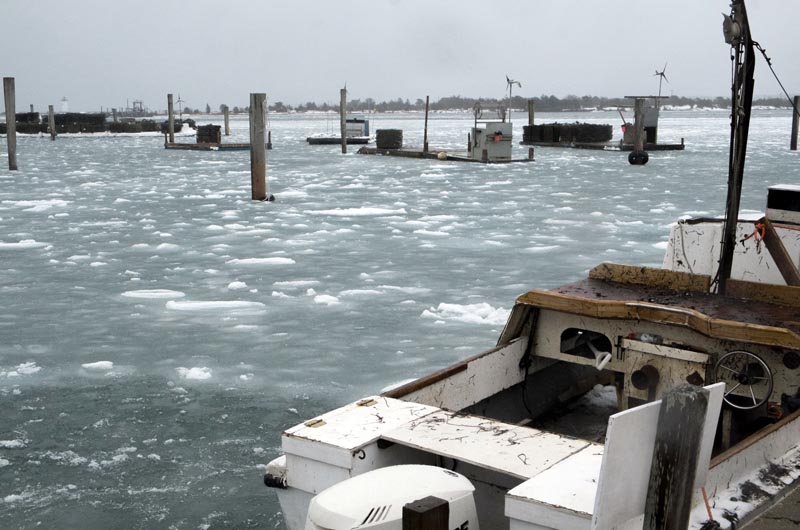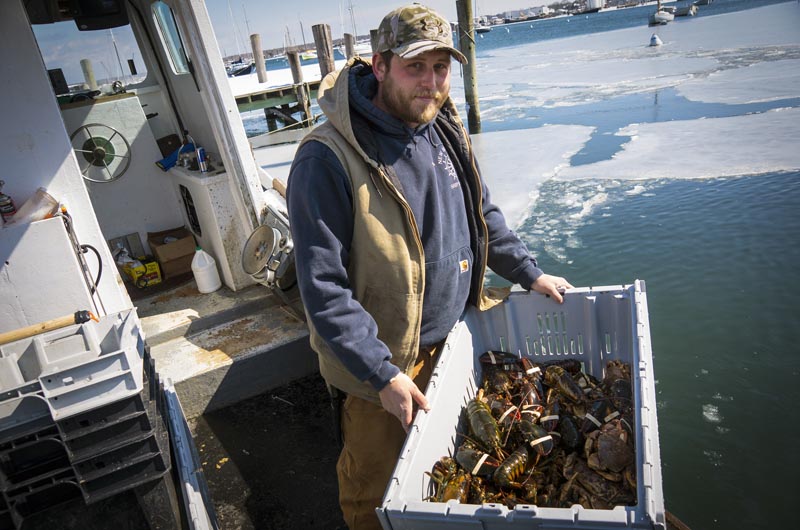Inshore fisheries from Edgartown to Chilmark ground almost to a halt this winter following winter storms, with ice more than a foot thick eventually forming in some places. Some of the ponds, including Tisbury Great Pond, froze over completely.
“This is probably one of the worst, if not the worst, winter we have ever had in terms of losing days fishing,” said West Tisbury shellfish constable Raymond Gale.
One boat owner took a 16-inch chainsaw to the ice in Tisbury Great Pond and never hit water, Mr. Gale said. By this week, the ice on the pond had thinned to about four or five inches.
As a result of the harsh winter Menemsha Fish Market has seen a shortage of local shellfish.
“We had a few mussels, but we pretty much sold out,” owner Stanley Larsen said this week. “I haven’t been buying any shellfish from off-Island, so hopefully the guys will get going this week. The ponds will start to thaw out and we will be able to get some more quahaugs and oysters.”
In response to the lost days, the Edgartown shellfish committee voted to extend the scallop season two weeks, to April 15. The West Tisbury shellfish committee will decide in the coming days whether to apply to the state for an extension. Chilmark may take similar action. Vineyard Haven and Oak Bluffs will not extend their seasons, and Aquinnah’s season closed in November to protect the young scallops.
With the warmer weather, some people in West Tisbury have been out preparing their boats, Mr. Gale said. “Everybody’s sort of chomping at the bit to get back to it.”
The harsh winter may have already claimed some of the scallops, though, which are more sensitive to freezing temperatures. But in Edgartown, at least, people were still finding scallops this week.
Edgartown shellfish constable Paul Bagnall said if the thaw continues, there could be about 20 scalloping boats in Cape Pogue through March, dropping to maybe a half dozen in April.
In some towns, the scalloping was basically finished by the first cold spell, said Rick Karney, director of the Martha’s Vineyard Shellfish Group, which supplies shellfish seed to Island towns. He said the oyster seasons, which usually run through April, were more affected by the lost days. Only Edgartown and West Tisbury have oystering seasons this year.
The shellfish themselves may have benefited from the winter, Mr. Karney said, since cold temperatures may impede the spread of the oyster disease Dermo, and may also be a setback for green crabs, a major shellfish predator. And a thick layer of ice can protect shellfish from eiders and other diving ducks.
But the colder temperatures are also stressful for some species. Ponds freeze from the edges in, forcing shellfish to go to deeper water to escape the ice. Anchor ice, on the bottom of a pond, can be deadly for quahaugs and scallops. Mr. Karney was unaware of anchor ice forming here this winter, but he said the effects of the freezing weather would not appear until after the animals thaw and their metabolism kicks in.
The water level in Edgartown Great Pond can be controlled to some degree by draining the pond or opening it to the sea. During periods of severe cold, Edgartown will raise the water level to keep the ice away from the shellfish.
Mr. Bagnall said that this winter wasn’t as harsh as some winters 30 or 40 years ago, when the annual shellfish harvests on the Cape and Islands were in fact much bigger. He recalled one year in the early 1980s when Cape Pogue had frozen by Christmas and about three months were lost from the scalloping season.
“People forget how good December and January were after the February that we just had,” he said. And despite the weather, this year’s scallop harvest in Edgartown was much better than last year’s.
As one promising sign of spring, Island towns have begun supplying their annual brood stock of quahaugs to the shellfish group for spawning. Edgartown fishermen found an opening in Sengekontacket Pond this week and delivered the first of the stock. Next in line for the spring are bay scallops and oysters.
The shellfish group has been running slightly behind schedule due to the ice and snow. “For a while I haven’t even been able to get into the office,” Mr. Karney said. But the water pump at the Vineyard Haven nursery is up and running, and Mr. Karney hopes to receive more brood stock next week.
“We usually do a spawning about the middle of April, so we could be on schedule,” he said.






Comments (1)
Comments
Comment policy »